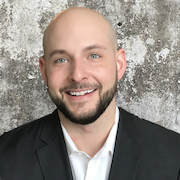
Jonathan’s career in tissue donation began in 2009 at Carolina Donor Services, now HonorBridge, where he held the roles of Tissue Recovery Specialist, Tissue Donation Coordinator, Tissue Recovery Supervisor, and Medical Examiner Liaison. In 2017, Jonathan joined the American Association of Tissue Banks (AATB) as the Director of Certification and Online Learning and was later promoted to Director of Education.
At AATB, he spearheaded significant educational initiatives and oversaw the development of educational programming, including webinars, conferences, and the Certified Tissue Bank Specialist program. Jonathan also promoted interdisciplinary collaborations with organizations such as AOPO, EBAA, AORN, NATCO, IACME, DLA, ABMDI, and NAME. Jonathan’s long-term involvement with AATB includes actively participating in the Education Committee, serving as a member and later as the staff liaison to the Recovery and Donor Eligibility Council, and co-authoring multiple industry documents, including the Guide to Medical Examiner and Coroner Cases. Jonathan has frequently presented in the AATB Webinar Series, AATB conferences, and the CTBS prep course.
Currently, Jonathan is the Director of Tissue Acquisition at Lonza, leading a multidisciplinary team that supports clinical and research initiatives reliant upon donated organs, tissues, and cells. Jonathan holds key positions within the International Association of Coroners and Medical Examiners (IACME), serving on its Board of Directors, Advocacy Committee, and Nominating Committee. He is also a member of the National Association of Medical Examiners, where he serves on the Ad-Hoc Organ and Tissue Procurement Committee.
Jonathan earned his undergraduate degree in communications and his Master of Science degree in management. He is a Certified Tissue Bank Specialist and a certified Lean Six Sigma Black Belt.
Collaborating with medicolegal professionals: Maximizing donation opportunities
Jonathan Boyd1.
1Tissue Acquisition, Lonza, Inc., Walkerville, MD, United States
Summary: A significant number of potential organ and tissue donors fall under the jurisdiction of medical examiners, coroners, forensic pathologists, or other medicolegal professionals. Ensuring donation opportunities are not lost requires careful coordination to preserve forensic evidence while supporting the lifesaving gift of donation.
This presentation will explore best practices for fostering collaboration between the medicolegal and donation communities. We will highlight key insights from the jointly published Guide to Medical Examiner and Coroner Cases, examine international efforts that promote interdisciplinary cooperation, and share proven strategies to align investigative integrity with donation advocacy.
Learning Objectives:
1. Summarize potential gaps that donation may create on forensic cases
2. Outline general challenges in establishing collaboration between donation and medicolegal death investigation professionals
3. Review initiatives supported by AATB, AOPO, EBAA, and the International Association of Coroners and Medical Examiners (IACME)
4. Review the Guide to Medical Examiner and Coroner Cases
5. Review practices that donation organizations may implement to support medicolegal partners on shared cases to ensure donation may take place on all possible cases
[1] Medical examiner
[2] Coroner
[3] Death investigation
[4] Donation restriction